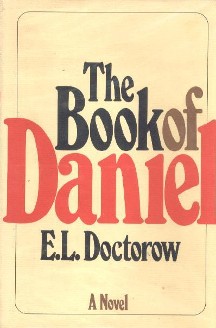|
The Book of Daniel (novel)
The Book of Daniel (1971) is a semi-historical novel by E. L. Doctorow, loosely based on the lives, trial and execution of Julius and Ethel Rosenberg.[1] Doctorow tells the story of Paul and Rochelle Isaacson (stand-ins for the Rosenbergs) through the persons of their older son, Daniel, and his sister, Susan, who are college students deeply involved in 1960s politics.[2] SynopsisWriting his doctoral thesis ('The Book of Daniel'), a political genealogy of the American Old Left,[3] Daniel Isaacson confronts his own personal relationship to that historical narrative by investigating the background to his parents' conviction and execution by the State, with some assistance from his adoptive parents (the Lewins). The dénouement is the revisiting, in flashback, of the death of his parents, Rochelle and Paul Isaacson, and, in due course, the death from nervous disorder (and attempted suicide) of his sister Susan. The novel closes as the library in which Daniel is working is closed by student protests. Doctorow closes his novel with a parody of lines from Chapter 12 of the Biblical Book of Daniel.[4] This moment culminates a merger of the text's two primary levels of narrative concern: Daniel's self-conscious inability to find and tell his own truthful personal history, which mirrors the anxiety of the radical 1960s New Left to emerge from the failure of the Communist Party to achieve its revolutionary potential in the 1950s.[3] The book is written in four parts, and in each Daniel is the principal narrator; the narrative moves fluidly and rapidly between 1967 ('the present') and flashback (to the late 40s/early 50s), and between first and third person:
Film, TV or theatrical adaptationsThe book was adapted as a film, Daniel (1983), directed by Sidney Lumet.[citation needed] Lumet somewhat changes the emphasis of the novel, to concentrate more on the 1940s left-wing politics of the parents. This was an era of which Lumet had close personal experience – the film is generally less well-regarded than the book. Allusions to historical events
References
External links
|
||||||||||||||||||||||||||
